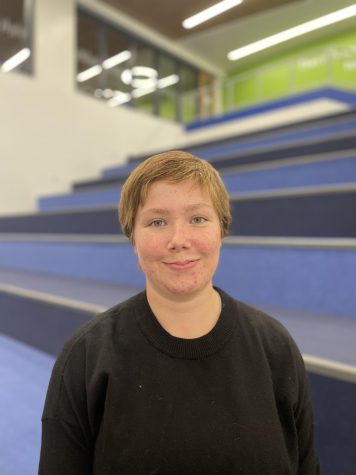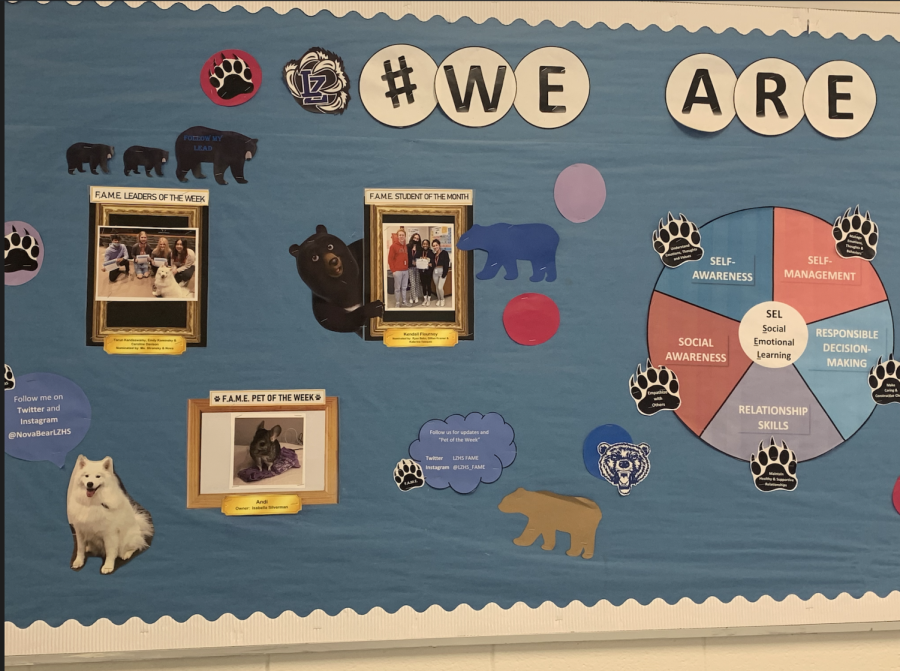F.A.M.E., freshmen, and high school
How the F.A.M.E. program impacts freshmen
Photo by Mckenzee Johnson
The F.A.M.E. board near the counseling office. It displays people and events in the F.A.M.E. program of note.
The transition from middle school to high school can be difficult for many students. Freshmen shift from a relaxed middle school academic environment to a more rigorous high school environment. F.A.M.E., a class for freshmen at LZHS, is designed to help with the change.
Freshman Achieving Maximum Excellence (F.A.M.E.) is a program that all freshmen are enrolled in. According to the LZHS Program of Studies, F.A.M.E. is designed to prepare freshmen for high school and help them learn to be successful.
“[W]e really focus on social-emotional learning, so that they can gain the best experience and take advantage of everything that the high school provides them with,” Charly Mendygral, senior F.A.M.E. leader, said.
Students attend F.A.M.E. for half of their lunch period, three days a week. According to freshman Isabella Silverman, this can be difficult.
“I kind of feel as if it takes up my lunch period. Sometimes I’ll feel sick because I don’t have enough to eat, and that affects me for the rest of the day,” Silverman said.
Ann Lustig, school counselor and F.A.M.E. sponsor, said that this concern has been considered.
“It’s hard right now with all of the COVID protocols because some teachers don’t want students to be eating in the classroom. So it is hard to navigate around that. Were the restrictions lifted where students were allowed to eat in the classroom, we would be very flexible to that. Just at this moment, we don’t have that flexibility,” Lustig said.
Not having enough time to eat their lunch is not the only concern students in the F.A.M.E. program have.
“[S]ome of the material we learn in FAME can definitely be useful. But most of the time, it’s not very useful. I feel like we’re there just for the sake of being there, not to actually learn anything,” Keira Holmes, freshman said.
However, Leslie Thomas, school counselor and F.A.M.E. sponsor, said that this is not the case.
“Our lessons touch upon the three major areas of counseling, so they touch upon college and career, academics and then social emotional. So all of our lessons stem from those three areas and all of those areas help the students not only transition to high school, but prepare them for high school and life beyond,” Thomas said.
In addition to these concerns, Lustig said that students often express concerns about the fact that F.A.M.E. schedules prevent them from eating with others.
“[W]e tell students who are concerned that they’re going to be spending this time with the same students throughout the semester. The lessons in F.A.M.E. are designed not only to teach them college and career readiness, as well as academic and social emotional skills, but they’re also there to help build relationships with the people they have lunch with. We’re giving them the opportunities to make friendships and feel more comfortable with the people in that class so that when they do have F.A.M.E. they at least have somebody to sit with at a table,” Lustig said.
Although many students may have complaints about F.A.M.E., they do recognize that it has certain benefits.
“I enjoy the activities. It’s a bit more free form than other classes. We try to have fun,” Holmes said.
Although these benefits can be hard to recognize, Mendygral says that as a F.A.M.E. leader, she has seen how F.A.M.E. impacts students.
“The freshman experience for F.A.M.E. this year is very different than mine. I know it’s kind of a struggle, and kids have less motivation than they used to,” Mendygral said. “But it’s one of those things where you get what you put into it. So if you’re a super active F.A.M.E. student, you’re going to learn.

As a sophomore, this is Mckenzee’s first year on staff. She loves to follow politics and current events. At school, she is a member of the speech team...

